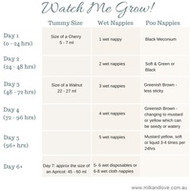Baby's First Week - What Should You Expect?
Posted by Corryn Barakat on Mar 05, 2015
You've been anticipating this moment for almost 9 months, but suddenly you have a newborn baby in your arms and you have no idea what to do or how to care for this teeny tiny infant. What do you do?!
First of all, don't stress - it's quite normal to feel like this. In this day and age many of us new mums haven't had much exposure to babies before giving birth to our own. We haven't grown up watching and helping other mums breastfeeding, and caring for their babies. In addition, advice on how to care for your baby has changed dramatically over the recent generations. Information given to our mothers or mothers-in-law may be quite different to information we are now given.
We now know that babies should be breastfed on demand - whenever they show signs of hunger. We also know that babies should be exclusively breastfed until 6 months of age, no other fluids or solids (including water) are needed. Feeding only breastmilk during this time is good for babies gut flora and immune system, as well as a whole host of other benefits.
We also know that feeding frequently during the early days after birth will help to establish a good milk supply, and will also reduce engorgement, or very full breasts. It is normal for babies to lose up to 7% of their birth weight in the first couple of days after birth and then, once your milk comes in, to gain on average 170 g/week.
Many mums report concerns about low milk supply. Your baby may be nursing on and off, on and off, on and off, constantly, and seeming unsatisfied. Your breasts may not feels as full as they first did, or a helpful visitor may tell you that a bottle of formula will help your baby be more settled and sleep better.
However, all of these are normal and could be due to your baby needing extra fluids due to heat, or a growth spurt, or even just for extra comfort as he goes through a development spurt. Your breasts may have settled down once your milk production is established, and be producing exactly the right amount of milk for your baby. Giving a baby a bottle of formula unnecessarily may cause issues with milk supply, engorgement, or nipple confusion. It is a good idea to seek advice from a lactation consultant, child health nurse or the ABA before giving your baby a bottle of formula.
The chart below shows the common guidelines for the first 7 days of your babies life, and what output to expect. If your baby is producing wet and dirty nappies, and gaining enough weight, then you probably do not have low milk supply.
It is important to always listen to your Mothers Instincts - if you are at all concerned, we always recommend talking to your child health nurse, a lactation consultant, calling the Australian Breastfeeding Association hotline, or talking to your GP.
How was your experience as a new mum in those first tumultuous, hormonal early days?


